A video game about writing? Sounds awful.
If that doesn’t give you an idea about my stellar attitude going into a playthrough of Elegy For A Dead World, let’s talk a little history. Before today, there were only two video games I played that could possibly be categorized as writing-related.
One was Mario Teaches Typing. I guess Mario is more exciting than Mavis Beacon. Far as I know, Mavis Beacon never attained invincibility or the ability to throw fireballs. But I'm not ruling it out. I never made it to Mavis' advanced lessons. If the programmers of Mavis Beacon DID include that stuff, they made a big mistake in hiding it all in the later levels. You have to give us a taste to keep us coming back! Let's see Mavis throw a dagger at a vampire or something, maybe pilot a spaceship that's about to crash land.
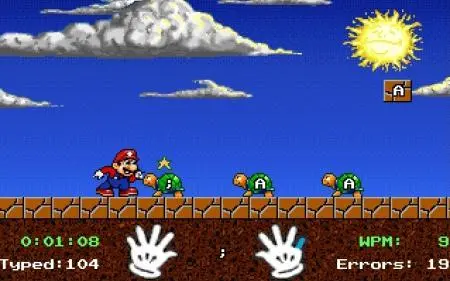
Mario Teaches Typing is a great tool if your goal is to wish you were playing any game besides Mario Teaches Typing. As a typing teacher, I guess it's fine, although I object to the idea that I was typing semicolons before I typed a single letter that appears IN MY OWN NAME. How does that work? And why do typing programs always push knowledge of individual keys first? Can’t we type words? Bad words? Shit? Shitty shit? Well, now I’m just abusing my columnist power, but you get the idea. Mario Teaches Typing was better than the alternative typing programs, but that’s only because the alternatives were total shit (alright, I had to do one more, but I’m done now).
The only other writing game I've played, and the writing connection gets pretty tentative here, is Alan Wake. In Alan Wake, you play as a horror writer named...Alan Wake. He's the video game Stephen King, which means younger and handsomer and knows how to use a pistol and wears the same clothes all the time. I lost interest in that game pretty fast. The main thrust seemed to be replacing batteries in flashlights, which is something I hate in real life and really don't need to simulate in a game. As for the writing aspects, you DID collect coffee cups for some kind of bonus. So that’s…that’s something.
When Elegy For A Dead World came along, it wasn't my first writing game, but it was the first one that looked like a real game, and it was the first one that looked like it actually involved writing. And it was ambitious. Not only would this game be a writing tool. It would teach poetry. Like, old poetry. Byron. Shelley. Keats. Yeah.
Confessions. Let's get these out of the way.
I'm an English major. I've read a good deal of old poetry, and it doesn't do a lot for me. It's too impenetrable. I'll be the first to admit, this can be because of my shortcomings as a reader, my tendency to laziness and the fact that I have a hard time following any thread that doesn't run pretty straight.
My experience with these poets is similar to my experience with writing games. Shallow-ish, and not something I remember fondly.
With a disdain for old poets and learning games in my heart, I decided to give Elegy a try.
I don't want to spend a lot of time talking about how the game plays. Let's get it out of the way so I can talk about whether it's a good writing tool, how it feels, and if it's any fun.
When you begin the game, you're a future-y astronaut floating in space, the last survivor of some kind of space disaster. Space explosion, space crash, someone forgot to use the space mixer to mix the space liquids in the space tanks. You know the drill. The space drill. A bad thing happened in space, as is the norm, and now you’re the last remaining person.
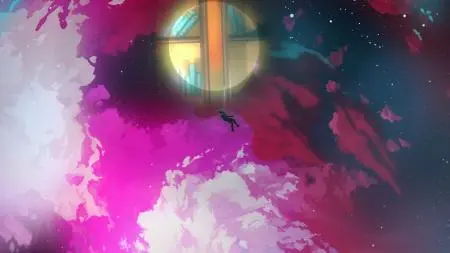
You float around through the credits sequence with a jetpack, then pass through some...uh, space fog? I think fog might be impossible in space. I haven't watched all of Cosmos, so my space facts are pretty sketchy, but the point is you end up in this area with three portals. Each portal leads to a different planet. Keats, Shelley, or Byron.
Your original space mission was to record what happened on these worlds. Now that you’re the only survivor of the crash, your mission is even more important. As the game developers’ site puts it:
Your mission remains the same: survey these worlds and write the only accounts of them that outsiders will ever know.
You select one of the three portals, and then you select from a healthy list of writing options. Check out Byron, for example.
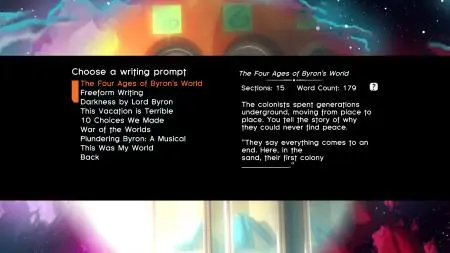
You can basically re-write "Darkness" by Byron with some key words left out. You fill in some blanks, MadLib style. You can select a prompt called "This Vacation is Terrible" which begins with the text "Oh. My. God" and is angled towards a younger voice. There is a pretty awesome variety of prompt types to pick from, and you can also go freeform, which lets you stop and write whatever you want, wherever you want.
Then you’re on Byron. You walk/jetpack along. There’s not much difference between walking and jetpack-ing other than the jetpack being faster. And also the fact that it’s a jetpack. Every so often you see a quill pen icon near the bottom of the screen. If you stop in the quill pen spots, you get the chance to write.
For the most part, the quill pens show up in spots with some interesting wreckage, inside some building, or near a statue. There's something to look at, an obvious reason to be prompted in a particular spot.
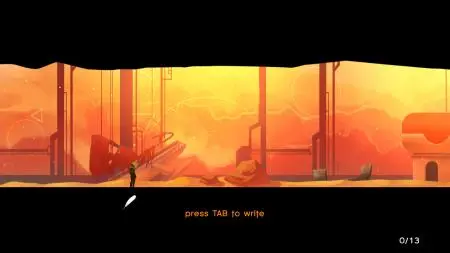
Once you finish a prompt, you can go back, review your work as a whole, revise, screenshot and print it with provided images. You can go back and redo prompts, complete other prompts, or try out the different worlds.
That's the basic idea. Now let's talk about whether the basic idea works.
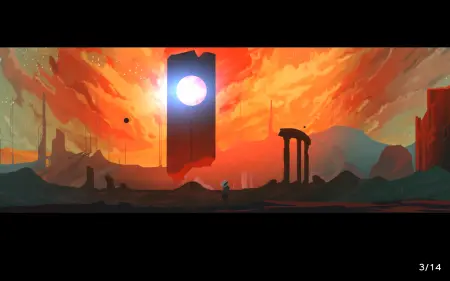
I started on Byron with the "Darkness" prompts, the mode that has me messing around in Byron’s classic poem.
Here's what's cool about it.
You fill in about 10% of the text, so even though you're not reading the original poem, you're still gaining some familiarity with the material. AND, the prompts aren't stiff. What I mean is, you can choose to just fill in the blanks, or you can change the words around the blanks too. This comes in handy with some subject/verb, plural/singular stuff, and with a little customization. Don't care for the line "Morn came and went, and Men…"? Change it to "women". Or "Bart Simpson." Whatever you want. The plasticity of the prompts makes them a lot more fun.
The other great thing provided in this fill-in-the-poem mode? Context. Okay, this is not likely the context that Byron was thinking of when he wrote "Darkness." Right? An astronaut being the sole survivor exploring a dead world?
Oh, wait.
Darkness is a poem written by Lord Byron in July 1816. That year was known as the Year Without a Summer, because Mount Tambora had erupted in the Dutch East Indies the previous year, casting enough ash into the atmosphere to block out the sun and cause abnormal weather across much of north-east America and northern Europe. This pall of darkness inspired Byron to write his poem. Literary critics were initially content to classify it as a "last man" poem, telling the apocalyptic story of the last man on earth.
Whoa. So other than the space suit, it's pretty damn close.
What about the Keats poem you can fill in on planet Keats? "When I have Fears That I May Cease to Be”?
Of the wide world I stand alone, and think
Till love and fame to nothingness do sink.
And the Shelley poem? "Ozymandias"?
The central theme of "Ozymandias" is contrasting the inevitable decline of all leaders and of the empires they build with their pretensions to greatness.
Turns out, teen lit isn't the first genre to capitalize on this post-apocalypse business. Not by a long shot. Nor are disaster movies. Turns out, Bruce Willis and his band of roughnecks may have never braved asteroids and "space dementia" for our entertainment if it weren't for some old-timey poetry guys.
There’s a beauty in the context Elegy brings to these poems. It’s not the original context, but it’s a good analog, and it’s helpful for someone afflicted by my particular brand of stupid.
I can watch you tie a knot 10,000 times, and if you hand me two pieces of rope, I’ll mess it up. I can watch something an endless number of times, but it’s not until I do it that I can actually understand. It’s not until I feel the ropes in my hands, make the movements myself, it’s not until I do those things that I can tie the knot myself.
Part of the impenetrability of poetry, especially older poetry, is that it can feel like a spectator sport. It’s hard for me to feel involved. To really get in there and start messing around.
With this, I have that choice. I can get into the poem, walk through the poem and its creation. Messing with something, re-forming it into different shapes, that’s how I learn. Changing the form of it, that's the easiest way for me to see how it was formed in the first place.
This game is teaching me poetry. It’s happening.
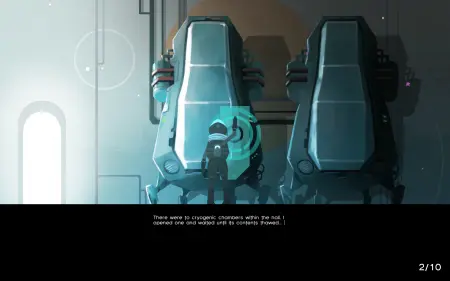
Outside poem-based prompts, there’s still a lot to do and explore. There are 8 options on each planet for a total of 24 (including freeform), and they cover a wide variety of tones and emotions. There's a lot of fun to be had in the simple pleasure of messing with this game. Pushing on things to see what happens.
I’ve explained to you why I’m not a great poet. Now let me explain why I’m not a great gamer.
Take a game like Super Mario 64. Your basic 3D platformer. You put Mario through his paces, jump around, collect stuff. It’s an awesome game, but before I finished, I became obsessed with surfing on a turtle shell. There are only a couple places you can do it, and one of those places is the first level. For hours, I sat and tried to surf that turtle shell to the top of a mountain. Up a twisty road to the flat top, where I was rewarded with absolutely nothing.
It’s that kind of stuff that really attracts me to a game. These little things that make me wonder if there were grander plans at some time. If there was a lot more turtle shell to be had in some long-lost version of the game. The things I love about games, they tend to be games within the game that I make for myself.
Elegy has that in spades. You can write the sort of thing the prompts hint towards. Or you can write whatever the hell you want and push the limits. You could tell any kind of story you want.
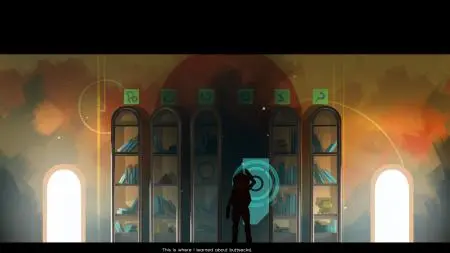
And in that way, or through that doorway, I think I found what I really like about playing this game.
This game is a lot more reminiscent of the games I played with action figures as a kid than it is of other video games. It’s more like free play, where inventing the story of the game was as important as the play that followed. When one kid would stop and say, "Wait, what if this guy was from space, so he has a laser that..."
Where a lot of the older games I love are pretty limited narratively while being expansive in gameplay, Elegy flips that model. There's not a lot of gameplay involved in moving the character around. There aren’t any pits to fall into or health bars or coins. But the story depth is limitless. It lets you play, and it lets you create. Maybe more like a Sim City kind of game. Heavier on freedom, but lighter on some of the other gameplay elements. Where Sim City took the worldbuilding idea very literally, Elegy lets players take on the task in an artistic, very different way.
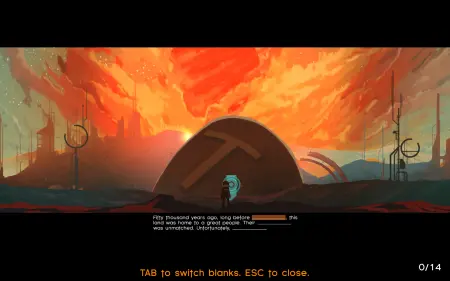
Let's talk about this as a game.
The magazine Gamepro used to rate things using different categories, and the marker was this kid’s face. Just this generic drawing of a white boy that would express his feelings on a game with a sleepy face if he hated it, an excited face if he loved it. If he REALLY loved it, he looked like he'd pushed a finger in an electric socket and just kept on pushing. His hair standing out, his mouth open wide in a 90's, "YEAHHHHH!"

Let's use that scale to talk about Elegy as a game.
First category: Graphics
The graphics are beautiful. They really are gorgeous, and the way they often sync up with the writing prompts, the way the backgrounds and objects give you something to type about, they function the way they’re supposed to, and they're very pretty.
The only complaint I have about the graphics, sometimes it's a little intimidating. I don't know what to type because I just think what I'm looking at is so cool. It’s a little like being dropped in a museum and being asked to write something beautiful about a piece of art that you find stunning. What can you say about the art that lives up to the art itself?
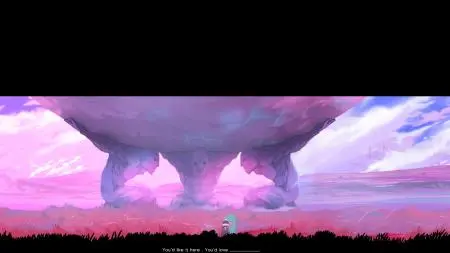
The sense of wonder and exploration starts with the graphics, and these visuals are up to the task.
Second category: Sound
It's a quiet game. It's definitely intended to be a quiet game. The ambient music is nice, and it wouldn't make sense to have much else. The worlds are meant to feel empty, and if there was a sweet soundtrack along the lines of Nine Inch Nails’ contribution to Quake, the mood would be ruined.
For this category, I'd draw a kid who was satisfied. Maybe with an empty bag of Flamin' Hot Cheetos empty in his lap. It's not a meal, but it'll do.
Third Category: Control
There's not a lot to control, really. That's something players might miss. There's nothing tricky about the controls, nothing that doesn't work. But really, it's move and type.
You can jetpack or walk, and even though the jetpack is faster, I preferred walking a lot of the time. Using the jetpack, it felt like sprinting through an art gallery. The normal thing in an art gallery is walking, yes? Possibly while drinking wine? I don’t go to a lot of art galleries.
I wonder if there’s room for further, more game-y options. Some portions that involve a little more gameplay, jetpacking up through a vertical chamber. I think I’m a little too excited by this jetpack business, really.
For control, Gamepro boy would be pretty neutral. The control totally works, and it’s in no way frustrating. There’s just very little to control. The movement is subordinate to the writing.
Fourth Category: Fun Factor
I want to use this category to talk about Elegy as a writing tool AND a game.
There are a lot of games that rely on twitch reflexes, on hitting the right button at the right time. And there are a lot of games that are puzzlers, games that drop you into a maze and have you work your way out.
Elegy is different. The reflexes you call on are more emotional. The puzzles are puzzles that don't have quantifiable best answers.
I had fun. I like writing, but I don't particularly like old poetry. And the game gives you slack. You can kind of make it whatever you want. If you wanted to screw around, there's fun to be had screwing around. If you wanted to learn about poetry, there's a depth of experience found here that I don't know I've gotten elsewhere.
This is fun. It’s a fun game. But it’s a different kind of fun.
Gears of War is fun because it’s like playing an insane, early-90’s action movie. Tetris is fun because it’s a game that puts you in the zone. It’s peaceful and stressful at the same time.
Elegy is fun that I’d compare to going on a hike. Every moment isn’t thrilling joy. But the total experience, all these little discoveries and moments, lead up to something very nourishing and effective. Even if you’re not screaming with orgasmic joy at every keystroke, there’s a pleasure here. It’s a quieter, slower pleasure that’s hard to compare to other games.
Which makes sense. Elegy isn’t really doing what other games do. I don’t think it’s meant to be Gears of War or Tetris. It’s really a different animal.
Gamepro kid? He’s standing on top of a mountain. He’s got a backpack, and he’s wiping sweat off his brow. He’s smiling. He doesn't want to take an early-morning hike every weekend. But once in a while, he's pretty happy to do it.
I'm thinking way too much about this made-up kid.
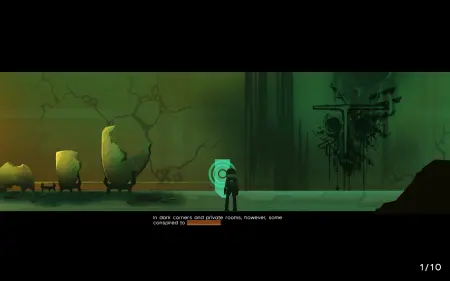
I feel like there's also a need to defend this game. From both sides.
I feel like there's many a gamer who would say this is not a game.
I also feel like there's many a poet who would say this isn't writing poetry.
I'll just remind you of two things.
One, there are a lot of gamers out there who have very stupid opinions on the way people should interact with each other, stupid on the level that it pretty much invalidates how they feel about most things. Personally, I think the debate on what is or isn't a game is stupid because Monopoly is a game, and I can't stand that. Hitting a metal hoop with a stick seemed to be a game of sorts at some point in history, and this is a hell of a lot more game than THAT. There are a lot of definitions of what is and isn’t a game out there, but I think we should face facts. Like the Supreme Court’s porn decision, I know a game when I see it. I know a game when I see a game, and this is a game.
Here’s the second thing I’ll remind you of. There are many poets out there who are just like the bad sort of gamers. Maybe tweedier, maybe more likely to have a walking staff or to wear turtlenecks. Just the way some gamers want to tell you what is and isn't a game, these folks want to tell you that something is or isn't poetry.
When someone tells me that this or that isn't poetry, I question, then, what IS poetry? Only sonnets? Only something with a rhyme scheme? Only words written with intentional line breaks? Press someone for a hard definition of the difference between prose and poetry and see what comes up. I’m betting you that the answer includes a lot of “sometimes” and “typically” and “for the most part.” I'm betting you that for any definition, there are dozens of examples in one of those fat Norton anthologies that'll crack that definition in half.
Here's what I'm going to tell you:
I majored in English. I entered a poetry chapbook into several contests and got some nice feedback. I love video games, and I've been playing Castlevania obsessively on my lunch breaks, to the point that I'm bothering people with the endless comparisons of real life things to Castlevania things. When someone is describing how difficult it is to clean out a blender, trust me, they will not appreciate a well-crafted Castlevania comparison.
Elegy is a game. You can use it to read and write poetry.
Like most games, the fun factor depends on what you put into it. Like all poetry, the quality is dependent on what you put into it.
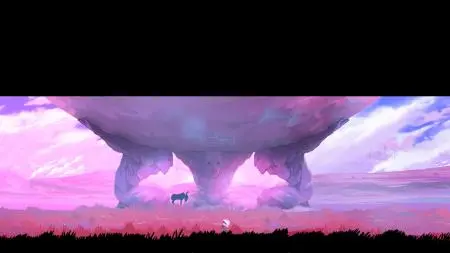
If you're reading this, if you're a visitor of this site, you'll dig something about this game. It'll be a new experience for you, no matter what. It’s not perfect, but it’s a better mix of play and writing than just about anything else I’ve encountered.
If you’re a gamer who stumbled onto this site about writing, welcome. And you should try Elegy too. As much as it’s a game for writers, it might function even better as writing for gamers, or writing for non-writers of any background, really. If you're a gamer who is tired of the newest shooter being pretty much the same as the last shooter, then lean into change a little bit and give this a shot.
I’ll end with a last piece of advice. If you hate poetry, if you hate games, this is your chance to insert the word SHITHEAD into a video game and a piece of classic poetry at the same time.
If you love games and poetry…well, same advice.
You can get Elegy For A Dead World here, which you should. You can play Mario Teaches Typing here. Which you should, but just for about 30 seconds.

About the author
Peter Derk lives, writes, and works in Colorado. Buy him a drink and he'll talk books all day. Buy him two and he'll be happy to tell you about the horrors of being responsible for a public restroom.








